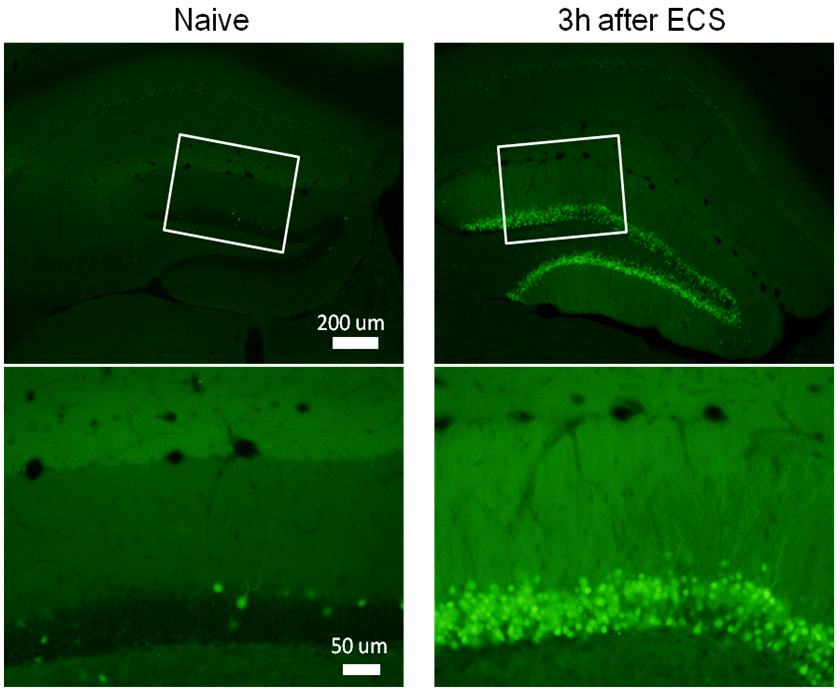|
Visualizing the neuronal activity-regulated gene Arc C57BL/6-Tg(Arc-EGFP/Arc)3Hbto/HbtoRbrc (RBRC06086)
Neuronal activity-regulated induction of EGFP-Arc in the hippocampus Fluorescence images taken from the hippocampus of a transgenic (Tg) mouse kept in a home cage (left panel, naïve) or a Tg mouse that received an electro-convulsive shock 3 hours earlier (right panel, ECS). The framed areas in the upper panels are expanded and shown in the lower panels. |
| Activity-dependent gene expression and protein synthesis in mature neurons are required for long-term memory formation. In particular, Arc (also called Arg3.1) has emerged recently as an attractive candidate of cognitive function-related gene products whose induction correlates with physiological neuronal activity. In the postsynaptic density, Arc protein regulates the surface expression of AMPA-type glutamate receptors at excitatory synapses [1]. This function is implicated in several forms of protein translation-dependent synaptic long-term depression and homeostatic plasticity/synaptic scaling. To examine Arc dynamics in living neurons, the expression of a monomeric EGFP-tagged Arc was driven under the control of the 7 kb Arc promoter [2, 3]. Neuronal activity-triggered Arc protein was found to rather accumulate in synapses with low activity, and thus may play a role in an ‘‘inverse” tagging process, to prevent the undesired enhancement of weak synapses in potentiated neurons [3]. Genomic mutations in the Arc gene were recently proposed to be associated with several neurological and psychiatric disorders, including schizophrenia [4]. |
| Depositor | : | Haruhiko Bito, M.D., Ph.D. Department of Neurochemistry The University of Tokyo Graduate School of Medicine |
|
| Strain name | : | C57BL/6-Tg(Arc-EGFP/Arc)3Hbto/HbtoRbrc | |
| RBRC No. | : | RBRC06086 | |
| References | : | [1] | Chowdhury S, Shepherd JD, Okuno H, Lyford G, Petralia RS, Plath N, Kuhl D, Huganir RL, Worley PF. Arc/Arg3.1 interacts with the endocytic machinery to regulate AMPA receptor trafficking. Neuron; 52:445-459, 2006. |
| [2] | Kawashima T, Okuno H, Nonaka M, Adachi-Morishima A, Kyo N, Okamura M, Takemoto-Kimura S, Worley PF, Bito H. Synaptic activity-responsive element in the Arc/Arg3.1 promoter essential for synapse-to-nucleus signaling in activated neurons. Proc Natl Acad Sci U S A.; 106(1):316-321, 2009. | ||
| [3] | Okuno H, Akashi K, Ishii Y, Yagishita-Kyo N, Suzuki K, Nonaka M, Kawashima T, Fujii H, Takemoto-Kimura S, Abe M, Natsume R, Chowdhury S, Sakimura K, Worley PF, Bito H. Inverse synaptic tagging of inactive synapses via dynamic interaction of Arc/Arg3.1 with CaMKIIβ. Cell; 149(4):886-898, 2012. | ||
| [4] | Fromer M, Pocklington AJ, Kavanagh DH, et al., De novo mutations in schizophrenia implicate synaptic networks. Nature; 506(7487):179-184, 2014. | ||
| July 2014 Contact: Shinya Ayabe, Ph.D. Experimental Animal Division, RIKEN BioResource Center All materials contained on this site may not be reproduced, distributed, displayed, published or broadcast without the prior permission of the owner of that content. |






